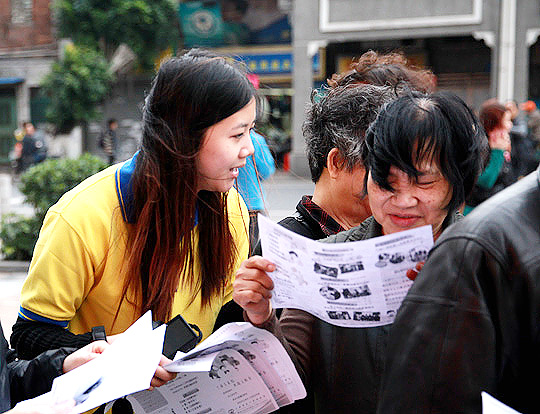Medical social workers assist public hospital reform

A medical social worker explains health information to a passerby on a street of Guangzhou.
Forming a key link in a country’s medical and health care system reform, the reform of public hospitals is vital. The current guidelines on China’s reform of public hospitals mainly focus on service system planning, administrative systems and reimbursement mechanisms. Reforms in these areas will, in the long run, highlight the function of public hospitals as entities of social welfare, revitalizing them and enhancing their social benefits.
However, public health services in China are currently confined to the traditional medical model, which emphasizes biological treatment of the patients. The professional division of labor within hospital departments makes the patients, in the doctors’ eyes, mostly physical collections of specific biological organs that need treatment and rehabilitation. However, as modern medical science develops, many are calling for a comprehensive model of health care that takes into account not only the physiological but also the psychosocial needs of patients.
Some doubt whether a comprehensive model of health care is feasible in China, where medical staff are often overburdened by heavy workloads. To ease the situation, medical social workers—in conjunction with doctors, nurses and medical technicians—can play an important role in medical institutions like hospitals, outpatient clinics, community health agencies and nursing facilities. In fact, medical social work is already an established profession in developed countries as well as China’s Hong Kong and Taiwan.
Medical social workers cooperate with a health care team in medical and health institutions to offer social services to patients, families and communities. Helping patients handle social and psychological problems that arise during illness and recovery, medical social work enhances the therapeutic effect for the patient with the goal of maintaining or recovering health, and strengthens the patient’s ability to adapt and reintegrate into society.
Medical social work adheres to the basic human-centered concept of social work: Viewing an individual patient as the synthesis of physical, psychological and social interactions. A medical social worker provides psychosocial support, case management, psychological education, counseling, referrals and other voluntary services. The main purpose is to help patients and their families to solve specific psychosocial difficulties, to adapt to the hospital environment, to provide access to resource support and to ease doctor-patient tension.
In fact, medical social work is not a new thing in China. As early as 1921, the Peking Union Medical College Hospital took the lead by establishing a medical social service department, and it carried out medical assistance, follow-up visits and other services. Since then, hospitals in Chinese cities, such as Jinan, Nanjing, Shanghai and Chongqing have set up similar departments.
Since the start of the new century, breakthroughs in research and practice have prompted hospitals in Beijing, Shanghai, Shenzhen and Guangzhou to explore a path of development that is suitable for medical social work across the nation today. This field has made great strides, but generally speaking, awareness about the importance of medical social work in 21st century Chinese society still needs to be raised.
In the context of medical reform, a steady supply of financial resources is vital for medical social work to thrive. This involves the selection of an efficient operating model. Medical social workers in the United States are formally hired and incorporated into hospital budgets according to scale and actual demand. In Hong Kong, social welfare bureaus and hospital welfare administrators are responsible for the management of medical social workers.
Medical social work in mainland China incorporates the model of the United States and Hong Kong, but is generally carried out by youth volunteers or university student interns. To reform public hospitals and emphasize the public good, China needs a regular professional system for medical social work supported and funded by hospitals. For large hospitals at the municipal level, a team of medical social workers with a repertoire of management, assessment and treatment skills is particularly important.

 PRINT
PRINT CLOSE
CLOSE